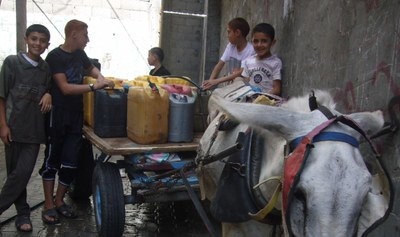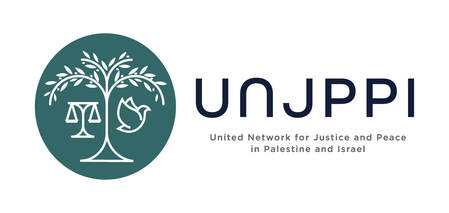Lenten Resources
 Children in Gaza fetching water. © EWN, 2014.
Children in Gaza fetching water. © EWN, 2014.
Seven Weeks for Water 2016
According to the Christian tradition, Lent is a time to prepare for the celebration of the death and resurrection of Christ. During this period many people engage in fasting and practise moderation or self-denial in order to focus on repentance and consecrating oneself to God. While water has a strong spiritual significance in the Christian tradition as a gift of God, this scarce resource is threatened and denied to millions around the world.
The EWN invites you to use this season of Lent to reflect on water. Since 2008, the EWN has been providing weekly theological reflections and other resources on water for the seven weeks of Lent and for World Water Day on 22 March.
Read more
Download PDF
According to the Christian tradition, Lent is a time to prepare for the celebration of the death and resurrection of Christ. During this period many people engage in fasting and practise moderation or self-denial in order to focus on repentance and consecrating oneself to God. While water has a strong spiritual significance in the Christian tradition as a gift of God, this scarce resource is threatened and denied to millions around the world.
The EWN invites you to use this season of Lent to reflect on water. Since 2008, the EWN has been providing weekly theological reflections and other resources on water for the seven weeks of Lent and for World Water Day on 22 March.
Read more
Download PDF
Resources for Preaching Lent 2 – Genesis 12: 1-4a
[Print]
“All peoples on earth will be blessed through you”. This is God’s call/pronouncement/promise to Abraham, to each of us, to our institutions, to the people of Israel and I believe to the Palestinians who have an historic connection with this land.
Recently I heard a new take on the Magnificat (Luke 1:47-55). It suggests that when Mary says “blessed am I among women” she is connecting with this age old blessing of Abraham. That intrigues me.
As we preach on what I find to be a key scripture passage, let’s remember that there are 3 faiths that see Abraham as father. Each of them can claim this promise or call – Judaism, Christianity and Islam.
It is my dream that the land over which Palestine and Israel currently struggle might indeed become a great nation – a means through which all the peoples on earth might be blessed. What would it take for that to happen – to create peace and justice in this place where the Palestinians were dispossessed in 1947/48; 1967 and indeed the dispossession continues today as a result of the occupation. The place about which Jewish people dreamed they might return, stretching back 2000 years.
These two peoples have so much in common – similar languages, similar customs, similar sense of hospitality. How might they come to see what they share in common rather than living in fear of the other and separated by walls?
One tricky part in this passage is God’s promise to “bless those who bless you and curse those who curse you”. Some Christian Zionists’ interpretation of scripture use this passage to support their view that God has promised a particular geographic land to a particular people. As a result they believe that those who do not see the Jewish people as sole proprietors of this land are cursing Israel and therefore will be cursed.
As the LIFE (Learning for International Faith Engagement) group prepared for a visit to Palestine and Israel I learned about the impact that Christian Zionism has on Christian Palestinians. People, like Bishop Elias Chacour of Ibilin near Nazareth – an Israeli and a Palestinian. He talks about “my brother and compatriot, Jesus, who walked these hills”.
It is not my practice in interpreting scripture. I look for the overall trajectory of the message that are found in both Hebrew and Christian texts.
Christians living in Palestine and with deep roots in the land are left asking the question – what about us? What does Christian Zionism and similar interpretations of Abraham’s blessing say about our Christian practice and our historic place in this land? It is disheartening for the indigenous Palestinian Christian community.
How can we (all who have received this blessing) hold up that dream – of a great nation – a nation by which all the peoples will be blessed – a nation in which Christians, Jews and Muslims live together in harmony witnessing to the whole world God’s dream for heaven on earth.
Linnea Good has a great song, “Blessed Are Those Who Are Called to The Table” on her cd Momentary Saints. This song about blessing supports, undergirds and preaches this dream as well as any sermon we might preach. And, it is based on the cultural value of generous hospitality – the hallmark of Jewish Israelis and Palestinians.
Rev. Marianna Harris, Vancouver, B.C.; co-chair United Network for Justice and Peace in Palestine and Israel
[Print]
“All peoples on earth will be blessed through you”. This is God’s call/pronouncement/promise to Abraham, to each of us, to our institutions, to the people of Israel and I believe to the Palestinians who have an historic connection with this land.
Recently I heard a new take on the Magnificat (Luke 1:47-55). It suggests that when Mary says “blessed am I among women” she is connecting with this age old blessing of Abraham. That intrigues me.
As we preach on what I find to be a key scripture passage, let’s remember that there are 3 faiths that see Abraham as father. Each of them can claim this promise or call – Judaism, Christianity and Islam.
It is my dream that the land over which Palestine and Israel currently struggle might indeed become a great nation – a means through which all the peoples on earth might be blessed. What would it take for that to happen – to create peace and justice in this place where the Palestinians were dispossessed in 1947/48; 1967 and indeed the dispossession continues today as a result of the occupation. The place about which Jewish people dreamed they might return, stretching back 2000 years.
These two peoples have so much in common – similar languages, similar customs, similar sense of hospitality. How might they come to see what they share in common rather than living in fear of the other and separated by walls?
One tricky part in this passage is God’s promise to “bless those who bless you and curse those who curse you”. Some Christian Zionists’ interpretation of scripture use this passage to support their view that God has promised a particular geographic land to a particular people. As a result they believe that those who do not see the Jewish people as sole proprietors of this land are cursing Israel and therefore will be cursed.
As the LIFE (Learning for International Faith Engagement) group prepared for a visit to Palestine and Israel I learned about the impact that Christian Zionism has on Christian Palestinians. People, like Bishop Elias Chacour of Ibilin near Nazareth – an Israeli and a Palestinian. He talks about “my brother and compatriot, Jesus, who walked these hills”.
It is not my practice in interpreting scripture. I look for the overall trajectory of the message that are found in both Hebrew and Christian texts.
Christians living in Palestine and with deep roots in the land are left asking the question – what about us? What does Christian Zionism and similar interpretations of Abraham’s blessing say about our Christian practice and our historic place in this land? It is disheartening for the indigenous Palestinian Christian community.
How can we (all who have received this blessing) hold up that dream – of a great nation – a nation by which all the peoples will be blessed – a nation in which Christians, Jews and Muslims live together in harmony witnessing to the whole world God’s dream for heaven on earth.
Linnea Good has a great song, “Blessed Are Those Who Are Called to The Table” on her cd Momentary Saints. This song about blessing supports, undergirds and preaches this dream as well as any sermon we might preach. And, it is based on the cultural value of generous hospitality – the hallmark of Jewish Israelis and Palestinians.
Rev. Marianna Harris, Vancouver, B.C.; co-chair United Network for Justice and Peace in Palestine and Israel
